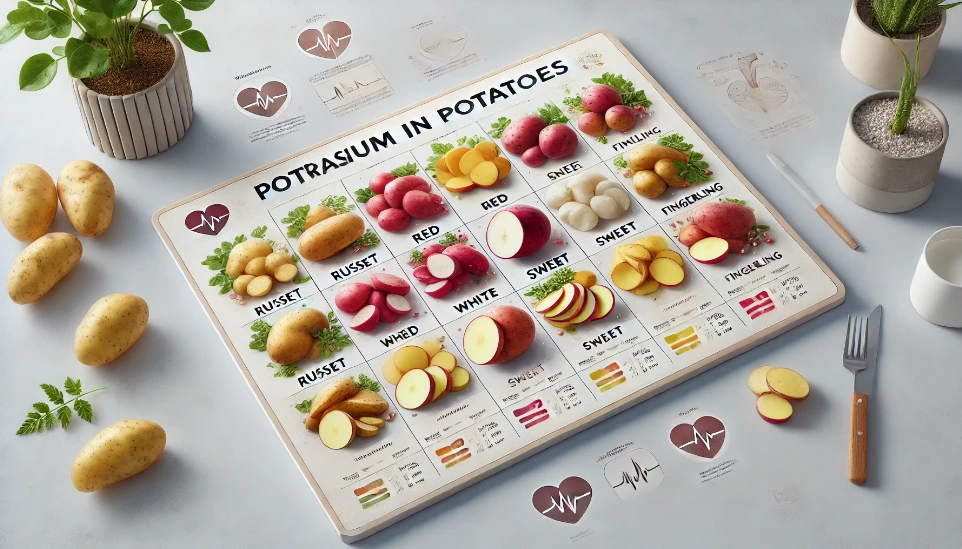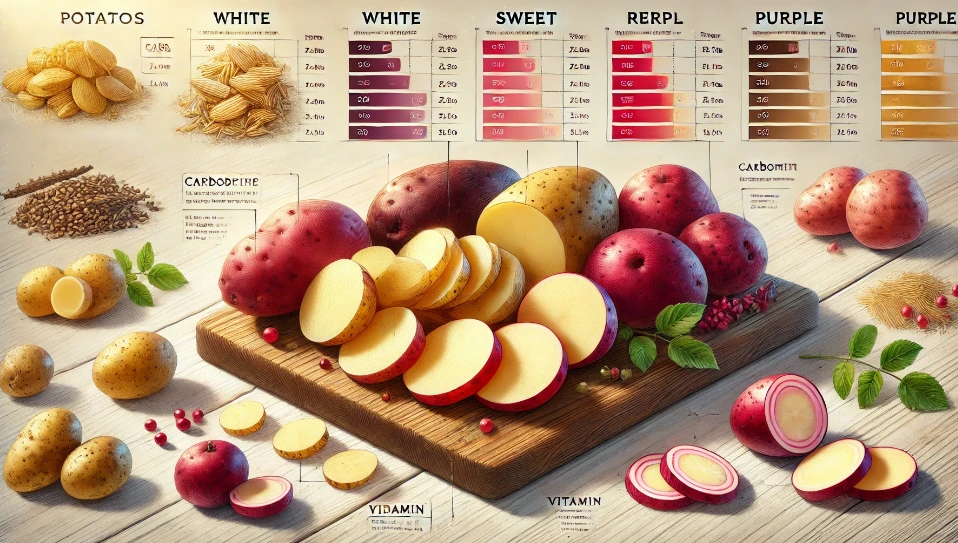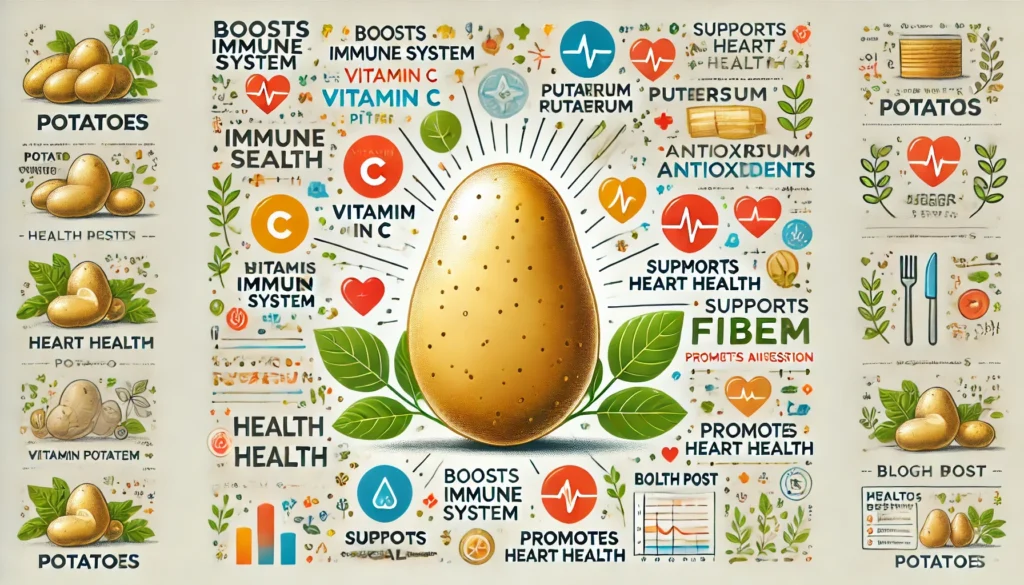Potatoes are often considered a humble vegetable, but they pack a significant nutritional punch, especially when it comes to potassium. This essential mineral plays a vital role in various bodily functions, such as maintaining fluid balance, supporting nerve and muscle function, and regulating blood pressure.
Potatoes are one of the best natural sources of potassium, and understanding how much potassium is in a potato and the associated health benefits can help you optimize your diet.
In this article, we will dive into the potassium content of different types of potatoes, how cooking methods affect the potassium level, and the pros and cons of incorporating potatoes into your diet from a health perspective. We will also explore some alternatives for those looking to increase their potassium intake.
Potassium Content in Potatoes
The amount of potassium in a potato depends on various factors, including the type of potato, its size, and the method of preparation. Below is a breakdown of the potassium content in common potato types.
| Type of Potato | Serving Size (1 medium potato, approx. 150g) | Potassium Content (mg) |
|---|---|---|
| Russet Potato (with skin) | 150g | 900-950 mg |
| Red Potato (with skin) | 150g | 700-750 mg |
| White Potato (with skin) | 150g | 600-620 mg |
| Sweet Potato (without skin) | 150g | 450-500 mg |
| Fingerling Potato (with skin) | 150g | 600-650 mg |
As seen from the table above, Russet potatoes lead the pack with the highest potassium content, followed by red and white potatoes. The potassium content varies between different potato types but remains substantial across all varieties. Consuming a medium-sized potato can contribute 15-20% of the recommended daily intake of potassium, which is around 2,500 to 3,400 mg for adults.
Why is Potassium Important?
Potassium is an essential mineral and electrolyte that offers multiple health benefits. It plays a critical role in:
- Fluid Balance: Potassium helps maintain the balance of fluids in the body, ensuring proper hydration.
- Muscle Function: It is necessary for muscle contractions, including those of the heart.
- Nerve Function: Potassium supports nerve signals and helps transmit messages between the brain and the body.
- Blood Pressure Regulation: Higher potassium intake can help balance sodium levels in the body, which is beneficial for maintaining healthy blood pressure.
Without adequate potassium intake, people may experience muscle cramps, fatigue, and in severe cases, heart-related issues.
How Cooking Methods Affect Potassium in Potatoes
Different cooking methods can affect the potassium content in potatoes. Here’s how some common cooking methods impact the nutrient profile:
- Baking: Potatoes retain most of their potassium content when baked with the skin on. Baking does not involve water, so there is minimal loss of potassium.
- Boiling: Boiling potatoes causes some potassium to leach out into the water, particularly if they are peeled before cooking. This could reduce the potassium content by 30-50%.
- Roasting: Like baking, roasting retains most of the potassium, especially when the potatoes are roasted with their skins on.
- Microwaving: This method preserves potassium well since it doesn’t involve soaking the potato in water, and cooking times are shorter, which helps retain nutrients.
- Frying: Frying potatoes in oil can slightly reduce potassium levels but the difference is minimal. However, frying adds unhealthy fats and calories, so it is not the best option if you’re trying to maintain a balanced diet.
Here’s a comparison of how potassium content changes with different cooking methods for a medium Russet potato (150g):
| Cooking Method | Potassium Content (mg) |
|---|---|
| Raw | 950 mg |
| Baked (with skin) | 900-950 mg |
| Boiled (peeled) | 500-600 mg |
| Roasted (with skin) | 850-900 mg |
| Microwaved | 900-950 mg |
Health Benefits of Potatoes’ Potassium
Including potatoes in your diet, particularly for their potassium content, offers several health benefits:
- Supports Heart Health: Potassium helps regulate blood pressure by balancing out the negative effects of sodium. A diet high in potassium can reduce the risk of cardiovascular diseases such as hypertension and stroke.
- Aids Muscle Recovery: Potassium plays a key role in muscle contractions and is essential for maintaining muscle health. Athletes or individuals engaged in physical activity may benefit from potassium-rich foods like potatoes for faster recovery after exercise.
- Boosts Brain Function: Potassium supports nerve signaling and neurotransmission, contributing to improved cognitive function and mental clarity.
- Prevents Kidney Stones: Potassium reduces calcium loss in the urine, which may help prevent kidney stones from forming.
- Balances Electrolytes: Potatoes can help restore electrolyte balance in cases of dehydration or after strenuous physical activity, making them a good option for maintaining overall hydration.
Pros and Cons of Potatoes for Potassium Intake
Pros of Eating Potatoes
- Rich Source of Potassium: Potatoes provide a significant amount of potassium, contributing to daily intake requirements.
- Versatile in Cooking: Potatoes can be prepared in many ways—baked, boiled, roasted, or mashed—making them easy to incorporate into meals.
- Affordable: Potatoes are generally inexpensive and widely available, making them a cost-effective way to boost potassium intake.
- Nutrient-Dense: Besides potassium, potatoes are also rich in fiber, vitamin C, and other essential nutrients.
- Supports Blood Pressure Control: Due to their high potassium content, potatoes can help balance sodium levels, aiding in the prevention of high blood pressure.
Cons of Eating Potatoes
- High in Carbohydrates: Potatoes are starchy and high in carbohydrates, which can contribute to weight gain if consumed in excess, particularly in processed forms like French fries and chips.
- Potassium Loss with Cooking: Some cooking methods, like boiling, can significantly reduce the potassium content in potatoes, making it essential to choose the right preparation method.
- Glycemic Index Concerns: Potatoes have a high glycemic index, which means they can cause spikes in blood sugar levels. This may be a concern for individuals with diabetes.
- Variety-Specific Nutrient Levels: Not all potatoes provide the same level of potassium, and some varieties, like sweet potatoes, contain less potassium than others.
- Processed Potato Products: Processed potato products, such as chips and fries, often contain unhealthy fats and excessive sodium, which counteract the health benefits of potassium.
Alternatives to Potatoes for Potassium
While potatoes are an excellent source of potassium, there are other foods that are also rich in this important mineral. If you’re looking to diversify your potassium sources, consider the following foods:
- Bananas: Often the go-to for potassium, a medium banana contains around 400 mg of potassium.
- Spinach: A cooked cup of spinach provides about 840 mg of potassium.
- Avocados: One medium avocado offers approximately 700 mg of potassium.
- Beans: White beans are especially high in potassium, with one cup containing around 1,000 mg.
- Tomatoes: A cup of tomato juice can provide 400-500 mg of potassium.
Comparison of Potassium in Other Foods
| Food | Serving Size | Potassium Content (mg) |
|---|---|---|
| Banana | 1 medium (120g) | 400 mg |
| Spinach (cooked) | 1 cup (180g) | 840 mg |
| Avocado | 1 medium (200g) | 700 mg |
| White Beans | 1 cup (240g) | 1,000 mg |
| Tomato Juice | 1 cup (240ml) | 500 mg |
Final Thoughts
Potatoes, especially when prepared with their skins on, are an excellent source of potassium, contributing significantly to daily dietary needs. Their versatility in cooking makes them an easy addition to any meal, and the health benefits of potassium, including better heart health, muscle function, and blood pressure control, make them a valuable component of a balanced diet.
However, not all cooking methods preserve the potassium content, so it’s essential to choose methods like baking, roasting, or microwaving over boiling to maximize the potassium benefits. And while potatoes offer many advantages, they should be consumed in moderation, particularly for individuals who are mindful of their carbohydrate intake or have specific dietary restrictions.
By combining potatoes with other potassium-rich foods like spinach, bananas, and avocados, you can ensure you meet your potassium needs while enjoying a variety of nutrients in your diet.



